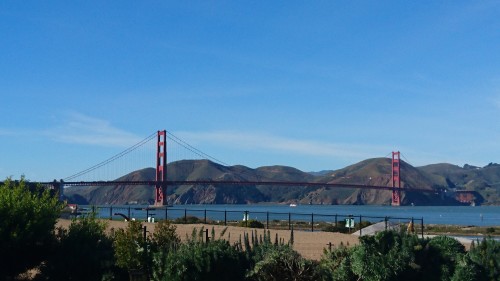
San Francisco’s Golden Gate Bridge welcomes scientific visitors to Photonics West – except for those banned from travelling to the US.
By Margaret Harris at Photonics West in San Francisco
“I’m an immigrant. I stole one American job. I helped create hundreds of thousands of others.”
Deepak Kamra’s words caused a stir among listeners at Photonics West, the massive industry trade show and scientific conference that descends on San Francisco, California each winter. Speaking at a panel discussion on “Brexit, US Policy, EU and China,” the Delhi-born veteran of the Silicon Valley venture capital scene said that he expected the new US administration – which recently imposed a travel ban on visitors from seven majority-Muslim countries – to target Asian and South Asian technology workers next. Restrictions on the number of foreign-born students studying science, technology, engineering or mathematics (STEM) at US universities could follow. Ultimately, Kamra concluded, “We are going to lose a lot of qualified people.”
Other panellists were more measured in assessing how the new administration will affect hi-tech companies and their employees. Chuck Comey, an attorney with extensive experience of working in China and Japan, said that the level of government scrutiny in business deals involving foreign stakeholders would “not be getting less” under President Donald Trump, but he discounted predictions of a trade war between the US and China. Another panellist, investment banker Bob Flanagan, argued that business deals were likely to continue “once businesspeople figure out some level of stability”. As for Trump’s public statements and tweets on trade and immigration, Flanagan added, “we hope there is an element of histrionics there”.
For a few would-be Photonics West attendees, though, the administration’s actions over the past week have been more than just hot air. Conference officials told me that at least two scheduled speakers were prevented from attending because they held passports from countries affected by the travel ban, and earlier today, the chief executive of SPIE, which hosts Photonics West, wrote to Trump expressing “concern” that the ban will “discourage the broader scientific community from travel to the United States for conferences such as this”.
If Kamra’s predictions are accurate, visiting scientists won’t be the only ones who feel the chill. After the panel discussion, I spoke with one Indian-born, US-educated audience member who said he was “very worried” that legal immigrants like him could be forced out. I’m not naming this man because he doesn’t have US citizenship or a “green card” (permanent legal residency) yet, but he’s an engineer and entrepreneur, the sort of person who, in normal times, would have expected – well, if not a welcome mat, then at least not a slammed door.
So what happens now? “It’ll be interesting to see whether [the Trump administration] can actually implement some of these rules,” Kamra told me. “We’ll have to see.”
In the end that should come soon, when President Trump should calm down, but this interval should be a good occasion for people to find alternative possible avenues in the world to collaborate and work with.
The different types of problems caused by President Trump’s administration should not have far reaching consequences, because of the more and more multipole nature of the global geopolitics.